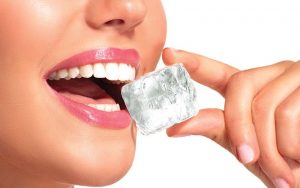Habits are not always easy to get rid off. In fact, some of these habits seem to ‘run on their own’ after some time – as if on auto-pilot.
Here, we look into some habits you may have that are detrimental to the health of your teeth. If you recognize any of these habits as one of yours, you know what to do!

1. Crunching on ice cubes: Crunching on ice cubes may seem harmless as ice cubes are just frozen water – they are natural and sugar free. However, it can injure the soft tissue inside the teeth, and also, frequent crunching leads to sensitive teeth. The hard cube can also crack or chip the teeth, not to mention lead to sharp, piercing pain due to the cold, icy cubes. The best option for those who like munching is to use a sugarless gum substitute.
2. Neglecting to use a mouthguard during sports: A mouthguard is a piece of protective plastic mold that protects upper teeth when playing rough contact sports, such as hockey, rugby or football. WIthout them, the teeth can get knocked out during a rough game. Mouthguards are available at stores and customised ones can be made by a dentist.
3. Bruxism or teeth grinding: Many people do this, either unconsciously, or knowingly – while they’re asleep or during times of stress. It can wear down the teeth over time, and you’ll feel the effects when there’s pain in your teeth while eating or drinking. Special mouthguards are available at pharmacies, and they can be worn to protect against damage from teeth grinding.
4. Lozenges, chewing gum and gummy candies: You might be wondering what do these even have in common and how do they relate to teeth damage. They have a high sugar concentration and also, eating them involves having them in your mouth for a prolonged period of time (either to suck on or to chew). Hence, they can cause a build-up of teeth plaque leading to cavities. It is always important to brush your teeth well after having any of these.
5. Sodas: Sodas contain excessive sugar, phosphoric and citric acids, all of which can damage the enamel. Although certain sodas have less sugar, the artificial sweeteners added in to compensate for it have been known to cause acid attacks on the enamel too. To be safe, ditch them – but if you do have them, gargle well afterwards.

6. Using teeth to open packaging: No matter how strong your teeth seem to be, they’re not meant for these. Opening plastic coverings and bottle caps using teeth can cause them to crack or chip.
7. Sport drinks: Many experts have already agreed that there really isn’t anything ‘sporty’ about sports drinks. All they do is provide a high dose of readily available sugar, but the problem with this is, it can easily lead to tooth decay. The best alternative to sports drinks, especially to stay refreshed and hydrated after working out or exercise, is pure drinking water.
8. Fruit drinks: Fruit juices have several health benefits and are a good source of antioxidants. However, these may have too much added sugar in them, which can damage your teeth. One way to tackle this is to have natural fruit juices without added sugar.
9. Potato chips: Potato chips and other starchy food items get broken down into acid by teeth plaque. The acid attacks the teeth for a longer duration in those who snack very often. It also happens when food remains get lodged between the teeth. So always make sure to clean your teeth (try flossing!) after meals.
10. Equent snacking: Snacking does not produce as much saliva as while having a meal. As a result the excess sugar does not get removed during snacking. One obvious option is to reduce snacking. Another way is to snack on healthier foods like carrots or celery sticks for example, that are low in starch and sugar.

11. Pencil chewing: This is a popular habit among people who tend to think a lot while writing, either at home, office or school. They have a tendency to chew or munch on something while working or studying, and it’s usually the object they have in their hand, which may happen to be a pencil. This habit is as detrimental to your teeth as chewing ice cubes. If you have such a habit, chew on sugarless gum instead.
12. Regular intake of tea and coffee: It’s not so much how you take your these beverages, but rather how regularly you take it, and if you brush your teeth well enough between intakes. This is because, regular tea or coffee intake without care can cause teeth discoloration over time. The acid in the coffee also contributes to yellowing of the teeth. These stains however, can be easily removed either by regular usage of whitening toothpastes or at a dental clinic using whitening treatments.
13. Cigarettes: Tobacco products contain loads of toxins, that not only damage the teeth, but the whole body as well. The smoking habit is known to cause gum disease and damage as well as teeth discoloration. It’s also known to cause cancer in mouth, tongue and lips.
14. Wine consumption: The presence of chromogen pigment and tannins in the wine, create stains on teeth. The acidity of wine is also detrimental to the tooth enamel, making it more vulnerable to discoloration. The acidic effects of white wine are equally damaging. Even though it does not cause direct staining, it can leave the teeth porous and increase susceptibility to stains. Washing the mouth with water and brushing using a whitening toothpaste can reduce staining effects.
15. Throwing up regularly: These usually take place among those who have an eating disorder called Bulimia nervosa. What happens is, the individual will forcefully throw up after eating, so as not to put on any weight. The acid content in vomit can damage and weaken the teeth. It also causes bad breath and can lead to many other health issues.
If you have any of the above going on in your life, the time to turn it around is now, so make the resolution and change your life already!


